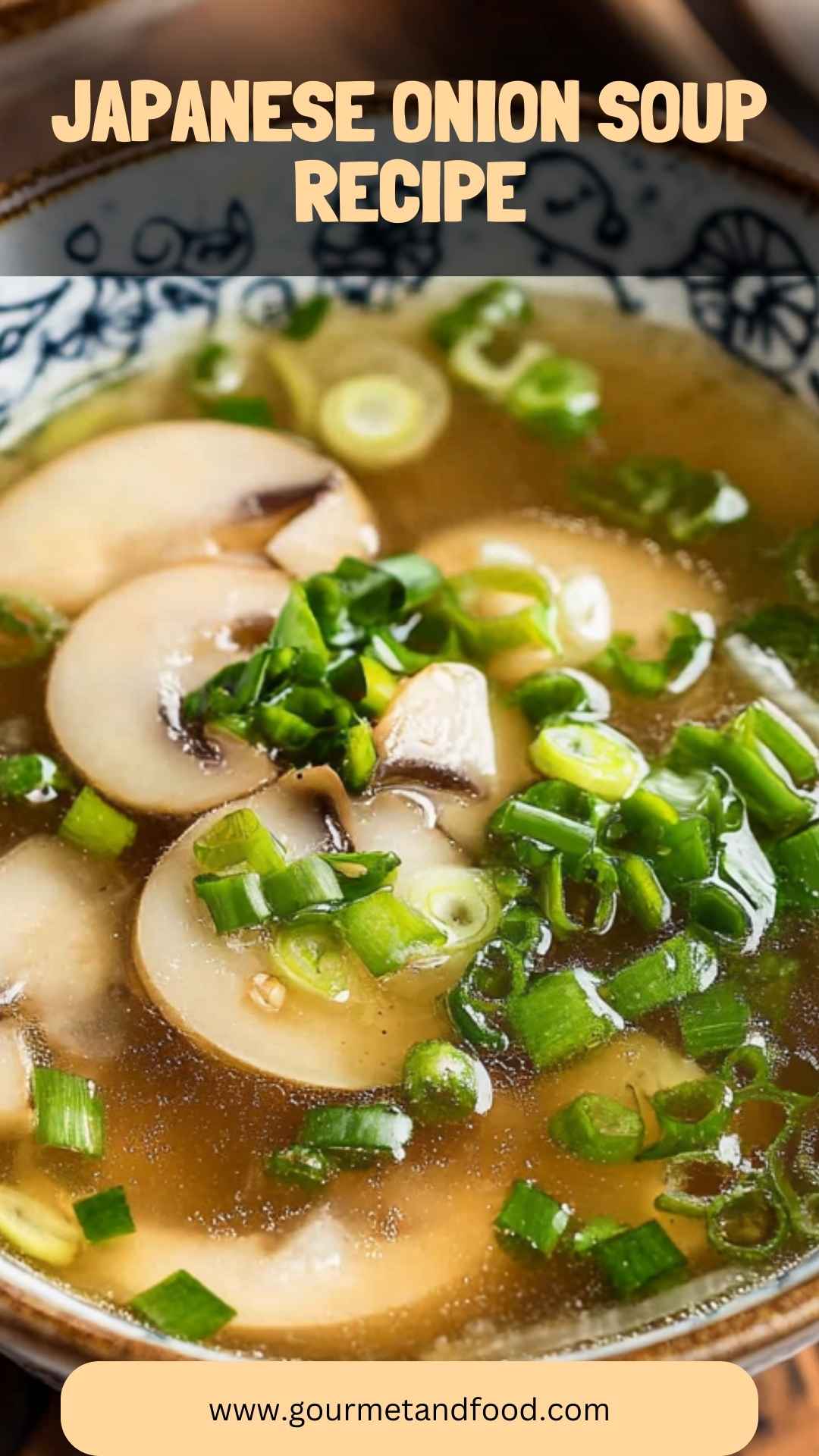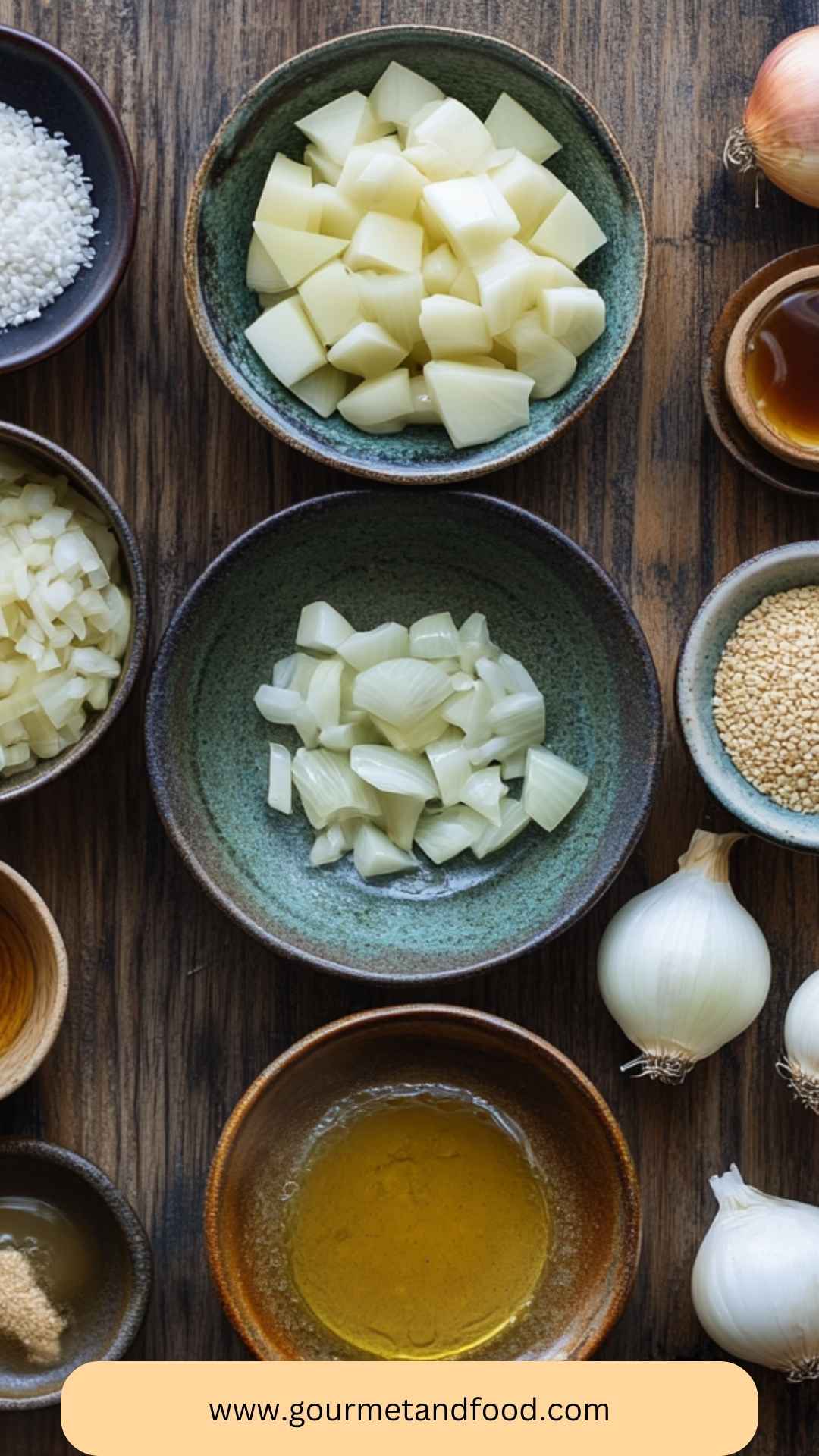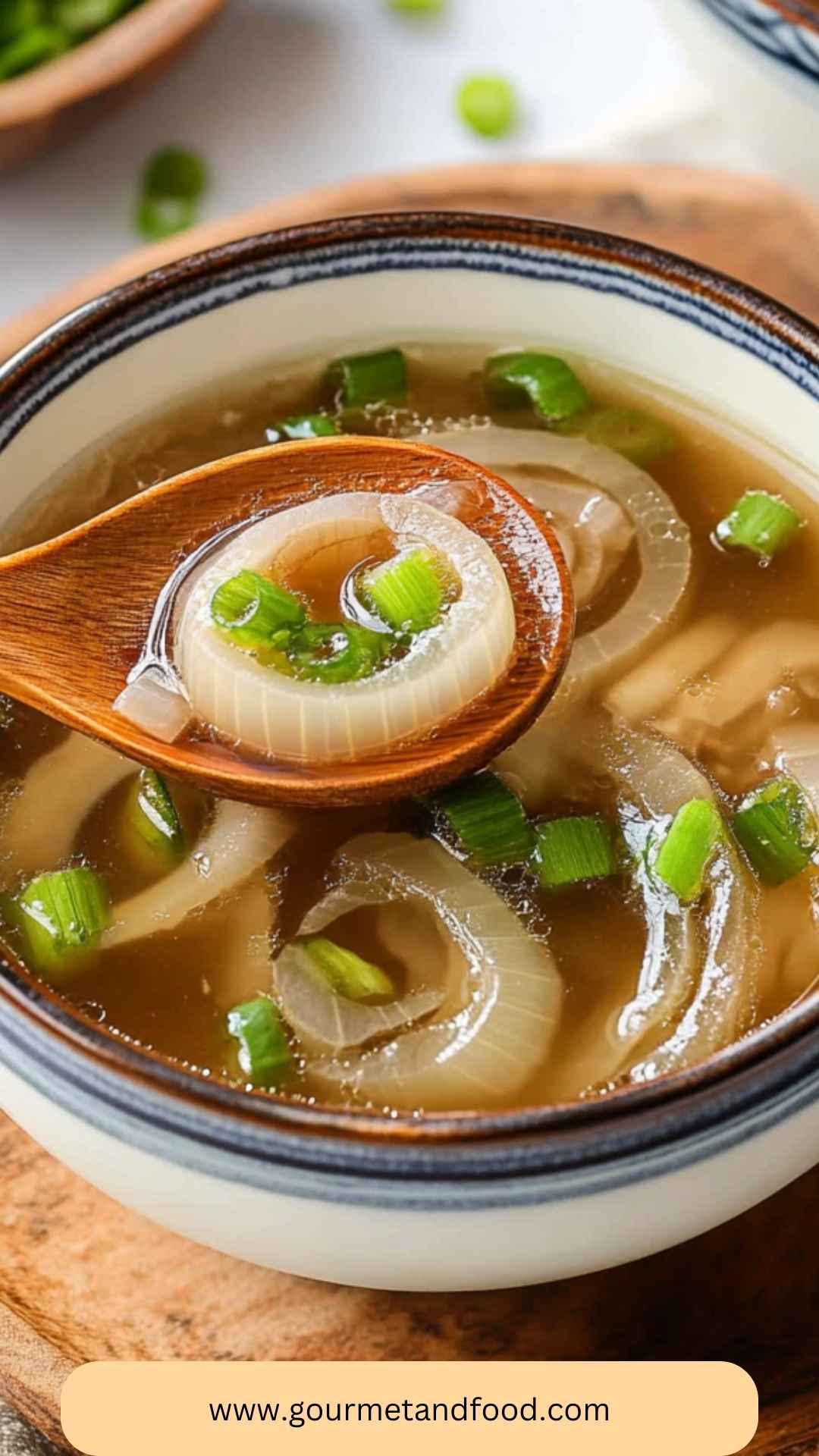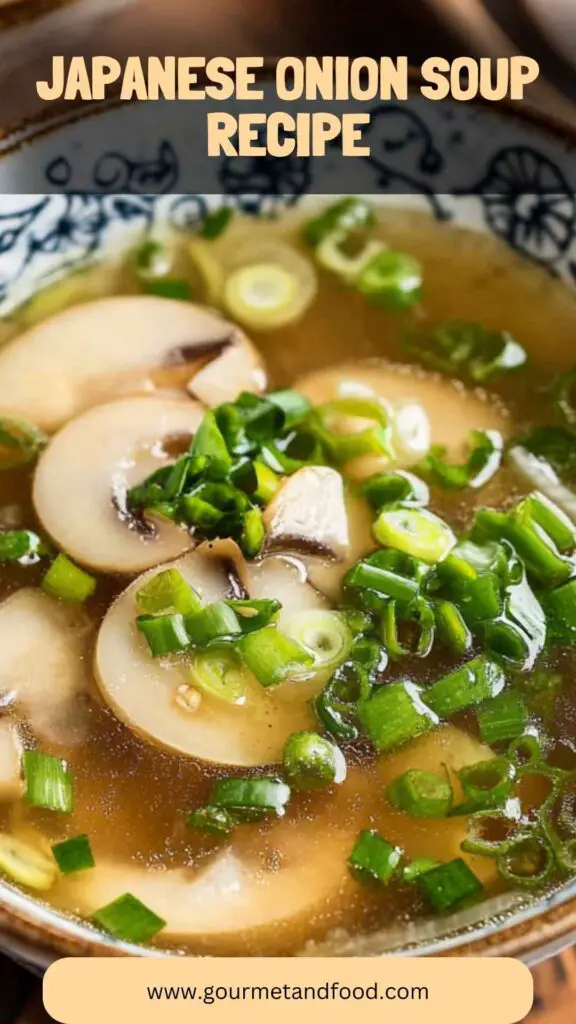Before we dive into the heart of Japanese onion soup, let’s take a moment to consider what pairs well with this delightful dish. Think about a warm, crusty baguette or freshly steamed rice. Both serve as excellent platforms for soaking up the rich flavors of the soup.
A light salad dressed with a citrusy vinaigrette can balance the warmth and savoriness of the onion soup beautifully. If you’re feeling adventurous, try serving it alongside gyoza, those delicious Japanese dumplings, for a full culinary experience.

What is Japanese Onion Soup?
Japanese onion soup is a savory dish that primarily showcases the humble onion. It typically combines caramelized onions, fragrant garlic, and roots like carrots and celery, all simmered in a hearty vegetable stock. A touch of soy sauce or rice vinegar can lend an extra depth of flavor, giving this soup a unique twist.
Japan has an impressive culinary tradition, integrating various international influences. Onion soup in Japan may not have the same rich history as its French counterpart, but it has carved its niche, often appearing in izakayas or at home on cold nights.
What is the Flavor Profile of This Dish?
Imagine the moment you slice an onion. That pungent aroma fills the air. Now, think about how that aroma transforms into a rich sweetness once those onions hit the heat. This simple metamorphosis is at the heart of Japanese onion soup.
The primary notes are sweet and savory, punctuated by the richness of the vegetable stock. You’ll find hints of umami from the soy sauce, while the ginger adds a refreshing, spicy lift. The layers of flavor are intricately balanced, making each spoonful both rewarding and addictive.
Why You’ll Love This
You might be asking, “What makes this soup stand out?” First, it’s comforting. There’s real satisfaction in cooking a dish that warms the soul. Second, it’s incredibly simple. The ingredients are accessible. Most of them are likely already in your kitchen, waiting for a moment like this.
Also, the recipe is versatile. You can modify it to fit seasonal ingredients or personal tastes. Finally, it’s packed with nutrients. Loaded with vegetables, this soup nourishes while delighting the taste buds. Whether you’re feeling under the weather or simply want something tasty, this soup does the trick.
Ingredients
Here’s what you’ll need to gather for your delicious Japanese onion soup:
- 1 tablespoon minced garlic
- ½ teaspoon freshly grated ginger
- 2 cups finely chopped onions
- 1 cup peeled and diced carrots
- 1 cup diced celery stalks
- 6 cups vegetable stock
- 1 teaspoon toasted sesame oil
- 1 cup thinly sliced button mushrooms
- ½ cup chopped green onions (scallions)
- Sea salt, to taste
- Freshly ground black pepper, to taste
- 1 tablespoon rice vinegar
- ½ teaspoon crushed red pepper flakes
- 1 teaspoon soy sauce (optional)
- 1 teaspoon sriracha sauce (optional)

Step-by-Step Instructions
Step 1: Prepare the Vegetables
Start by chopping your vegetables. Finely chop the onions; the more finely you chop, the quicker they’ll caramelize. Peel and dice the carrots. Chop the celery into uniform pieces. Set these aside in separate bowls.
Step 2: Sauté the Onions
In a large pot, heat some oil over medium heat. Add the chopped onions first. Stir them gently, allowing them to sweat and release their moisture. In about 10 minutes, they should become translucent. At this point, add in the minced garlic and ginger for an aromatic base, stirring constantly to prevent burning.
Step 3: Add the Carrots and Celery
Once the onions are nicely softened and fragrant, it’s time to add the carrots and celery. Stir them in, allowing their flavors to mingle with the onions. Cook for about five minutes. Colors should brighten, and things will start to smell heavenly.
Step 4: Pour in the Vegetable Stock
At this stage, you’ll want to pour in the vegetable stock. This is where the soup truly starts to come alive. Bring it to a gentle boil. Be cautious — you don’t want it bubbling away too much.
Step 5: Add Mushrooms and Seasonings
Once the soup is boiling, add the sliced button mushrooms. They’ll soak up all the goodness in the broth. Next, add your seasonings. Incorporate the rice vinegar, soy sauce, and crushed red pepper flakes. Stir well to combine.
Step 6: Simmer the Soup
Reduce the heat to low and let the soup simmer for about 20 minutes. This leisurely cooking allows the flavors to develop. Taste it halfway through to see if it needs more salt or pepper. Adjust according to your palate.
Step 7: Finish with Green Onions and Serve
Just before serving, sprinkle in the chopped green onions. They add a vibrant color and a fresh crunch that contrasts with the softness of the other veggies. Serve hot in bowls, optionally drizzling some sriracha for a spicy kick.
Tips & Tricks
Here are five recommendations to elevate your Japanese onion soup:
- Use Quality Stock: The flavor of your broth influences the entire soup. Opt for a good organic vegetable stock or make your own.
- Caramelize Slowly: Patience is key. Low and slow caramelization enhances the sweetness of the onions.
- Experiment with Umami: Feel free to add a dash of miso paste. It deepens the umami flavor significantly.
- Add Fresh Herbs: For an aromatic twist, finish with a sprinkle of fresh herbs like cilantro or basil.
- Make It Ahead: This soup is even better the next day. Let it cool, store it in the fridge, and reheat when you’re ready.
How Can You Store This Japanese Onion Soup?
If you find yourself with leftovers (a rare occurrence in my kitchen), storing the soup is quite easy. Allow it to cool first, then transfer it to an airtight container. It will last in the refrigerator for up to four days.
For longer storage, freeze the soup in individual portions. It should maintain its flavor and quality for about three months. When you’re ready to enjoy it again, thaw it overnight in the fridge and reheat on the stove.
Alternative Ingredient Choices
Sometimes, you may not have all the necessary ingredients on hand. Here are some alternatives:
- Onion: If you’re in a pinch and out of onions, consider using leeks or shallots. While they will slightly alter the flavor, they still provide sweetness and depth.
- Vegetable Stock: Homemade stock is wonderful. However, if you run out, water can work in a pinch. Just remember to add more seasonings for a flavor boost.
- Soy Sauce: In place of soy sauce, coconut aminos serve as a tasty gluten-free alternative. It offers a similar umami flavor without the soy.

Conclusion
Japanese onion soup is a delightful dish that embodies warmth and comfort. It’s the perfect remedy for those chilly evenings. With a few simple ingredients, you can whip up a bowl that nourishes and satisfies.
From the sweet perfume of sautéed onions to the savory depth of vegetable stock, each step draws you deeper into the joy of home cooking. Whether you’re looking to impress guests or seeking solace in a bowl, this soup won’t let you down.
So roll up your sleeves and get cooking; you are about to create something amazing. Enjoy the process, savor every spoonful, and let the flavors transport you. Bon appétit!
You’ll also like the following recipes!
- Vegetarian French Onion Soup Copycat Recipe
- How to Make Knorr French Onion Soup Mix
- Best Julia Child’s French Onion Soup Recipe

Japanese Onion Soup Recipe – Gourmet And Food
Description
Start with a cold evening. The kind where the sky turns dark way too early, and the chill creeps into your bones. What better way to combat that than with a steaming bowl of Japanese onion soup? This hearty bowl warms you up from the inside out. As someone who spends a lot of time experimenting in the kitchen, this soup has become a staple for me.
Its simple yet rich flavors tell a story of their own, weaving together elements of comfort. Today, I want you to join me in crafting this soulful dish that is as approachable as it is delicious. When prepared correctly, Japanese onion soup serves as a hug in a bowl — soothing and satisfying.
Ingredients
Instructions
Step 1: Prepare the Vegetables
-
Start by chopping your vegetables. Finely chop the onions; the more finely you chop, the quicker they’ll caramelize. Peel and dice the carrots. Chop the celery into uniform pieces. Set these aside in separate bowls.
Step 2: Sauté the Onions
-
In a large pot, heat some oil over medium heat. Add the chopped onions first. Stir them gently, allowing them to sweat and release their moisture. In about 10 minutes, they should become translucent. At this point, add in the minced garlic and ginger for an aromatic base, stirring constantly to prevent burning.
Step 3: Add the Carrots and Celery
-
Once the onions are nicely softened and fragrant, it’s time to add the carrots and celery. Stir them in, allowing their flavors to mingle with the onions. Cook for about five minutes. Colors should brighten, and things will start to smell heavenly.
Step 4: Pour in the Vegetable Stock
-
At this stage, you’ll want to pour in the vegetable stock. This is where the soup truly starts to come alive. Bring it to a gentle boil. Be cautious — you don’t want it bubbling away too much.
Step 5: Add Mushrooms and Seasonings
-
Once the soup is boiling, add the sliced button mushrooms. They’ll soak up all the goodness in the broth. Next, add your seasonings. Incorporate the rice vinegar, soy sauce, and crushed red pepper flakes. Stir well to combine.
Step 6: Simmer the Soup
-
Reduce the heat to low and let the soup simmer for about 20 minutes. This leisurely cooking allows the flavors to develop. Taste it halfway through to see if it needs more salt or pepper. Adjust according to your palate.
Step 7: Finish with Green Onions and Serve
-
Just before serving, sprinkle in the chopped green onions. They add a vibrant color and a fresh crunch that contrasts with the softness of the other veggies. Serve hot in bowls, optionally drizzling some sriracha for a spicy kick.
Nutrition Facts
Servings 6
- Amount Per Serving
- Calories 77kcal
- % Daily Value *
- Total Fat 8.8g14%
- Saturated Fat 7.1g36%
- Sodium 2mg1%
* Percent Daily Values are based on a 2,000 calorie diet. Your daily value may be higher or lower depending on your calorie needs.
Note
- Use Quality Stock: The flavor of your broth influences the entire soup. Opt for a good organic vegetable stock or make your own.
- Caramelize Slowly: Patience is key. Low and slow caramelization enhances the sweetness of the onions.
- Experiment with Umami: Feel free to add a dash of miso paste. It deepens the umami flavor significantly.
- Add Fresh Herbs: For an aromatic twist, finish with a sprinkle of fresh herbs like cilantro or basil.
- Make It Ahead: This soup is even better the next day. Let it cool, store it in the fridge, and reheat when you’re ready.





